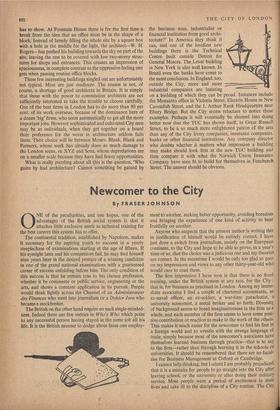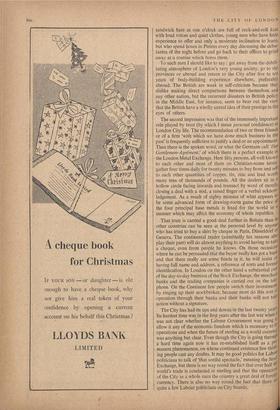Newcomer to the City
By FRASER JOHNSON 0 NE of the peculiarities, and one hopes, one of the advantages of the. British social system is that it attaches little exclusive merit to technical training for the best careers this system has to offer.
The continental tradition, established by Napoleon, makes it necessary for the aspiring youth to succeed in a yearly steeplechase of examinations starting at the age of fifteen. If his eyesight lasts and his competitors fail, he may find himself nine years later in the desired posture of a winning candidate in one of the grand national examinations with a guaranteed career of success unfolding before him. The only condition of this success is that he remain true to his chosen profession, whether it be commerce or public service, engineering or the arts, and shows a constant application in its pursuit. People would think lightly across the Channel of an Administrateur des Finances who went into journalism or a Doktor Jura who became a stockbroker.
The British on the other hand require no such single-minded- ness. Indeed there are few entries in Who's Who which point to any successful person having stayed in the same job all his life. It is the British manner to dodge about from one employ- ment to another, seeking better opportunity, avoiding boredom and bringing the experience of one kind of activity to bear fruitfully on another.
Anyone who suspects that the present author is writing this in justification of himself would be entirely correct. I have just done a switch from journalism, mainly on the European continent, to'the City and hope to be able to prove, in a year's time or so, that the choice was a judicious one and my theories are correct. In the meantime I would be only too glad to pass on my impressions and views to any other thirty-year-old who would care to read them.
The first impression I have won is that there is no fixed training, under the British system at any rate, for the City : that is, for business as practised in London. Among my imme- diate associates I find a couple of chartered accountants, an ex-naval officer, an ex-soldier, a war-time parachutist, a university economist, a metal broker and so forth. Diversity of background seems to breed imaginativeness in the firm as a whole, and each member of the firm seems to have some posi- tive contribution or reaction to make to the work of the others. This makes it much easier for the newcomer to find his feet in a foreign world and to wrestle with the strange language of trade, simply because most of the newcomer's associates have themselves learned business through practice—that is to say in the firm—rather than through learning it in the schools or universities. It should be remembered that there are no facul- ties for Business Management at Oxford or Cambridge. I cannot help thinking, but I admit I am probably prejudiced, that it is a mistake for people to go straight into the City after leaving school, or the university or after doing their military service. Most people want a period of excitement in their lives and take ill to the discipline of a City routine. The city sandwich bars at one o'clock are full of rock-and-roll kids with loud voices and quiet clothes, young men who have little experience to offer and only a moderate inclination to learn' but who spend hours in Pimms every day discussing the debu- tantes of the night before and go back to their offices to grind away at a routine which bores them.
To such men I should like to say : get away from the debili- tating atmosphere of London's very young society, go to the provinces or abroad and return to the City after five to ten years of body-building experience elsewhere, preferably abroad. The British are weak in self-criticism because they dislike making direct comparisons between themselves, and any other nation, but the recurrent disasters to British policy in the Middle East, for instance, seem to bear out the vice" that the British have a wholly unreal idea of their prestige in the eyes of others.
The second impression was that of the immensely important role played by trust (by which I mean personal confidence) in London City life. The recommendation of two or three friends or of a firm 'with which we have done much business in the past' is frequently sufficient to justify a deal or an appointment Then there is the spoken word, or what the Germans call 'Da•� Gentlemen-Agrement,' of which there is a perfect example the London Metal Exchange. Here fifty persons, all well known to each other and most of them on Christian-name terms' gather four times daily for twenty minutes to buy from and sell to each other quantities of copper, tin, zinc and lead worth many tens of thousands of pounds. All the dealers sit in a hollow circle facing inwards and transact by word of mouth. closing a deal with a nod, a raised finger or a verbal acknow ledgement. As a result of eighty minutes of what appears is be some advanced form of drawing-room game the price of the four principal base metals is fixed for the world in 3 manner which may affect the economy of whole republics.
That trust is carried a good deal further in Britain than in other countries can be seen at the personal level by anyone who has tried to buy a shirt by cheque in Paris, DiisseldOrf or Geneva. The continental trader (admittedly tax reasons also play their part) will do almost anything to avoid having to take a cheque, even from people he knows. On those occasions where he can be persuaded that the buyer really has got a bat and that there really are some funds in it, he will insist ( having full name and address, a reference of sorts and forma identification. In London on the other hand a substantial NO of the day-to-day business of the Stock Exchange, the merchant banks and the trading companies is carried out on the WI' 'phone. On the Continent few people switch their investmen by ringing up their stockbroker, because most do this sort operation through their banks and their banks will not tai action without a signature.
The City has bad its ups and downs in the last twenty year Its hardest time was in the first years after the last war when was not clear whether the Labour Government was going I allow it any of the economic freedom which is necessary to i operations and when the future of sterling as a world curren was anything but clear. Even though the City is going throng a bard time again now it has re-established itself as a pc manent phenomenon. on whose continued existence few thial ing people cast any doubts. It may be good politics for Label politicians to talk of 'that sordid spectacle,' meaning the Stogy Exchange, but there is no way round the fact that over half ti world's trade is conducted in sterling and that the operattof of the City. as a whole earn the country a great deal of foreig currency. There is also no way round the fact that there ill quite a few Labour politicians on City boards.
5



















































 Previous page
Previous page